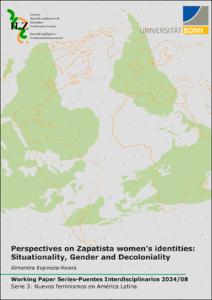Espinoza-Rivera, Almendra: Perspectives on Zapatista women's identities: Situationality, Gender and Decoloniality. In: Working Paper Series Puentes Interdisciplinarios, Serie 3, 08.
Online-Ausgabe in bonndoc: https://doi.org/10.48565/bonndoc-414
Online-Ausgabe in bonndoc: https://doi.org/10.48565/bonndoc-414
@article{handle:20.500.11811/12517,
doi: https://doi.org/10.48565/bonndoc-414,
author = {{Almendra Espinoza-Rivera}},
title = {Perspectives on Zapatista women's identities: Situationality, Gender and Decoloniality},
publisher = {Interdisziplinäre Lateinamerikazentrum (ILZ)},
year = 2024,
month = oct,
journal = {Working Paper Series Puentes Interdisciplinarios},
volume = Serie 3, 08,
note = {The aim of my work focuses on the analysis of the identities and resistances that Zapatis-ta women have been thinking and weaving since the emergence of the Ejército Zapatista de Liberación Nacional – EZLN (The Zapatista Army of National Liberation) in 1994 until the present. In the framework of what they call the ‘revolución interna’, this seeks to end the ‘malas costumbres’ that exist within their communities, particularly those practices of macho oppression exercised by their male counterparts, and which are generally based on gender roles. To understand this process, I analyse and reflect on the existing proximities and distances between the political proposal of Zapatista women, the approaches of decolonial feminism, and indigenous feminisms. As research sources I use previous research conducted in and on Zapatista communities; and my own experience of working with the Zapatistas on their “Zapatista Tour” in Europe between September and November 2021, in the cities of Frankfurt and Freiburg.},
url = {https://hdl.handle.net/20.500.11811/12517}
}
doi: https://doi.org/10.48565/bonndoc-414,
author = {{Almendra Espinoza-Rivera}},
title = {Perspectives on Zapatista women's identities: Situationality, Gender and Decoloniality},
publisher = {Interdisziplinäre Lateinamerikazentrum (ILZ)},
year = 2024,
month = oct,
journal = {Working Paper Series Puentes Interdisciplinarios},
volume = Serie 3, 08,
note = {The aim of my work focuses on the analysis of the identities and resistances that Zapatis-ta women have been thinking and weaving since the emergence of the Ejército Zapatista de Liberación Nacional – EZLN (The Zapatista Army of National Liberation) in 1994 until the present. In the framework of what they call the ‘revolución interna’, this seeks to end the ‘malas costumbres’ that exist within their communities, particularly those practices of macho oppression exercised by their male counterparts, and which are generally based on gender roles. To understand this process, I analyse and reflect on the existing proximities and distances between the political proposal of Zapatista women, the approaches of decolonial feminism, and indigenous feminisms. As research sources I use previous research conducted in and on Zapatista communities; and my own experience of working with the Zapatistas on their “Zapatista Tour” in Europe between September and November 2021, in the cities of Frankfurt and Freiburg.},
url = {https://hdl.handle.net/20.500.11811/12517}
}






